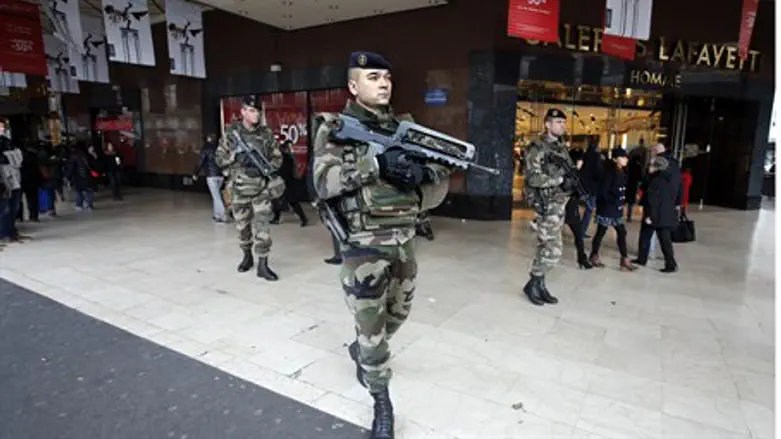
French and European officials will unveil the details of counter-terror measures Wednesday to deal with threats of new Islamist attacks and strengthen cooperation in the wake of the recent lethal shootings in Paris.
In the French capital, on high alert since jihadist attacks left 17 dead two weeks ago, Prime Minister Manuel Valls will outline promised measures to boost security forces.
The worst attack on French soil in decades put Europe on high alert, and a wave of police raids, investigations and extraditions have taken place across the jittery continent.
European Commissioners in Brussels will meet to discuss the 28-nation bloc's new counter-terrorism strategy, including changes to the region's Schengen Agreement free travel area and intelligence cooperation.
Meanwhile in Washington, President Barack Obama said the US stood side by side with terror victims around the world, citing the Paris attacks in his State of the Union address late Tuesday.
"We will continue to hunt down terrorists and dismantle their networks," he said, vowing action against "terrorists who pose a direct threat to us and our allies."
Last week Valls announced the creation of special files for people linked to terrorism, and said prisoners linked to radical Islam could be isolated in jail, a hotbed for radicalization.
Interior Minister Bernard Cazeneuve has said intelligence services could receive additional funding while security forces could get more powerful weapons and improved equipment.
According to a source, 400 million euros ($460 million) will go to the police for hiring, upgrading information systems and equipment.
Counter-terror raids across Europe
Four men suspected of supplying one of the gunmen behind the Paris attacks with weapons and vehicles were brought before an anti-terror judge Tuesday, the first to face possible charges over the shootings that shook France to its core.
The three gunmen who carried out coordinated attacks from January 7-9 were killed in dramatic police sieges, and prosecutors are now hoping to pin down those who assisted them.
Prosecutors called Tuesday for the men believed to have supplied gunman Amedy Coulibaly with weapons and vehicles to remain in detention and be charged with conspiracy to commit terrorist acts.
Coulibaly was behind the murder of four Jewish hostages at a kosher supermarket, and the murder of a policewoman, after brothers Said and Cherif Kouachi gunned down 12 people at satirical magazine Charlie Hebdo.
The attacks prompted a flurry of police activity across Europe.
In Germany some 200 police carried out raids on 13 apartments in Berlin and other locations to find evidence against two men arrested last week for allegedly backing jihadist violence in Syria.
This followed raids in Belgium last week that foiled potential attacks against police officers, and led to arrests in several European countries.
Greece on Tuesday ordered the extradition of a 33-year-old Algerian man with suspected links to the jihadist cell dismantled in Belgium.
The suspected mastermind of the plot, Abdelhamid Abaaoud, a 27-year-old Belgian of Moroccan descent, remains at large.
And in Bulgaria, a court ruled that a Frenchman who knew two of the Paris attackers should be returned to his home country.
France had issued an arrest warrant for Muslim convert Fritz-Joly Joachin, 29, who denies being an extremist but was detained after trying to cross from Bulgaria into Turkey before the attacks.
In southern France, five Russians from Chechnya were arrested on Tuesday with what police described as a dangerous amount of explosives, although the case was believed to be linked to organized crime and not radical Islam.
EU beefing up security measures
Many EU states have pushed for a US-style database of air travellers' details on the grounds that it would help track Islamist suspects, but the European Parliament has so far blocked the scheme saying it would breach civil liberties.
Some European nations have also been pushing for a tightening of the Schengen visa-free zone.
"They will discuss subjects including passenger name records and data retention, the functioning of the Schengen area and cooperation between security services," Commission spokesman Margaritis Schinas told a briefing on Tuesday ahead of Wednesday's meeting.
Charlie Hebdo magazine responded to the murder of many of its senior staff by publishing a new cartoon of Mohammed, the founder of Islam, which has led to massive protests in Muslim countries.
The Muslims burned French flags, and threatened the country in protests that have taken place in Chechnya, Afghanistan, Gaza, Iran and Pakistan - and even on the Temple Mount in Jerusalem.
In Niger protests turned deadly as ten people died and dozens of churches were torched by the Muslim mob.
In light of the Islamist terror attacks, France has begun discussing the inability to integrate poorer, migrant Muslim families, with Valls claiming on Tuesday that the country was plagued by "social and ethnic apartheid."
AFP contributed to this report.
